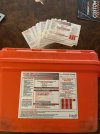I’m trying to find out if transport Canada says operating is the same thing as switching on. My teacher worked closely with transport Canada to develop the ROC-m, med-A3 and SVOP courses that were the standard for training. It’s all new now apparently. He’s the one who told me that switching your radio on is not considered operating. I’ll contact him direct if I can’t find it.
here is some clarity and actual examples, in regards to the term operating.
Firstly transport canada does not control the act or define it, the radio commiunications act is seperate from the canada shipping act which is mostly relevent to transport canada. However the section in the canada shipping act is reliant on the radiocommunications act in regards to VHF operation. Its not transport canada that makes decisions on this, neither transport canada the ROC, MED and SVOP courses actually have input or control, have no reflection and cannot superceed the Radiocommunications act.
switching on a device is operating it, you had to interact with it causing it to power up, if its malfunctioning it could cause problems by just being powered up. Or as another hypothetical point, you have a handheld and switch it on put it in your pocked down on a seat, gets covered with gear, and the mic button is depressed, from what point are you operating it?
you put your keys in the ignition of your car and start it, are you operating it?
you sit in your car pissed drunk keys in the ignition? can you get a ticked for operating under the influence?
they don’t need to differentiate between switching on and operating, because any intentional interaction that causes the device to function in any way is considered operating so the semantics don’t matter in this case.
I’ve run into this discussion many times, quite often by people who should know better and were adamant they were correct. I was trained by coast guard and the MCTS instructors at the coast guard college, I was trained on a full room MCTS simulator and we spent probably over 80 hours training to get our ROC. Very few people teaching these courses get that in depth or extent of training. These kinds of question were brought up in both the ROC course and our maritime law courses. This is the direct quote from the Radiocommunications act, it was discussed at length and here is the actual framework and wording that ends the argument.
"
radiocommunication.
radiocommunication or radio
means any transmission, emission or reception of signs, signals, writing, images, sounds or intelligence of any nature by
means of electromagnetic waves of frequencies lower than 3 000 GHz propagated in space without artificial guide"
As soon as your VHF is switched on it is now an operating radiocommunication device since is can at that point both send and receive, and you are required under this act to be licensed accordingly.
really what the arguement comes down to regarless of opinion, is what would happen if this was brought to court, the question would be asked, did you turn it on? the next thing would be the definition of operating, and presenting the radiocommunication act, and the admision would have to be made that turning it on is in fact operating, and that would be the end of that defense of "yes it was on but I wasnt operating it"
tc.canada.ca



